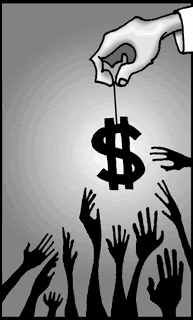From Daily Kos here.
Sun Oct 04, 2009 at 05:10:58 AM PDT
I went to see Michael Moore's new movie, "Capitalism - A Love Story".
It was moving, funny, and educational, all rolled into one. It made me feel both, proud and sad, to be an American. ... but it's recommended viewing if you still want to take OUR Country back, from the Powers that Be.
There are many lessons to be learned from the film -- But the one that struck me, the one I'm motivated to write about now --
Is the Lesson of Plutonomy ... aka. that Top One Percent ...
- jamess's diary :: ::
Plutonomy, perhaps like me, you've not heard much about this term, except in the occasional poorly defined rant. Well it's a word we should all learn more about -- since it's one of the new "code words" the uber-rich use to maintain their "high stations" in life.
Plutonomy
n. An economy that is driven by or that disproportionately benefits wealthy people, or one where the creation of wealth is the principal goal.
[Blend of pluto- (wealth) and economy.]In a report called "The Plutonomy Symposium Rising Tides Lifting Yachts," Ajay Kapur, Citigroup's global strategist, says the balance sheets of the rich are "in great shape, and will get much better," which is why he recommends going out and buying stocks of companies that cater to that very select market.
Spending by the uber-rich overwhelms that of the average consumer and helps explain why the U.S. economy has continued to do well and the U.S. dollar hasn't collapsed even in the face of the current federal budget deficit, a negative savings rate, global imbalances and high energy prices, he says. The United States is one of the plutonomy countries countries whose economies are powered by a relatively small number of rich people.
- Angela Barnes, "Want wealth? Invest in the uber-rich," The Globe and Mail, October 2, 2006
You see Michael Moore highlights a confidential report that Citigroup initially circulated only to its wealthiest customers. Those reports, since leaked, plainly discuss the power of the Plutonomy in America, and how it would only strengthen, as long as the "the rest us" (the non-plutonics) could be kept in the dark about the Plutonomy existence, its role, and its over-arching control in the American Economy.Even though the Plutonomy (the top 1%) control over 50% of the net worth in America -- they don't control the Votes!
The thing they most fear is the principle of "one person -- one vote".
You see despite their extreme wealth and power, they only have 1% of the vote; "the rest us" control the other 99% of the votes. So if we ever caught on and, I don't know, maybe raised their taxes back to where it use to be (40-90% range), well maybe they couldn't have a Yacht in every city, or a Mansion in a half dozen states. Maybe they couldn't "lose count" of how many homes they owned.
Well I tried to locate the confidential Citigroup reports cited in the film, and think that these next two links are them. Remember these Reports were NOT meant for consumption by us "common folk".Citigroup Plutonomy Report Part 1
Oct 16, 2005- The World is dividing into two blocs - the Plutonomy and the rest.The U.S., UK, and Canada are the key Plutonomies - economies powered by the wealthy. Continental Europe (ex-Italy) and Japan are in the egalitarian bloc.
- Equity risk premium embedded in "global imbalances" are unwarranted.In plutonomies the rich absorb a disproportionate chunk of the economy and have a massive impact on reported aggregate numbers like savings rates, current account deficits, consumption levels, etc.
This imbalance in inequality expresses itself in the standard scary "global imbalances". We worry less.
- There is no "average consumer" in a Plutonomy.
[...]
Indeed, traditional thinking is likely to have issues with most of it. We will posit that:
- the world is dividing into two blocs - the plutonomies, where economic growth is powered by and largely consumed by the wealthy few, and the rest.
Plutonomies have occurred before in sixteenth century Spain, in seventeenth century Holland, the Gilded Age and the Roaring Twenties in the U.S.
What are the common drivers of Plutonomy?
Disruptive technology-driven productivity gains,
creative financial innovation,
capitalist-friendly cooperative governments,
an international dimension of immigrants and
overseas conquests invigorating wealth creation,
the rule of law, and
patenting inventions.Often these wealth waves involve great complexity, exploited best by the rich and educated of the time.
- We project that the plutonomies (the U.S., UK, and Canada) will likely see even more income inequality, disproportionately feeding off a further rise in the profit share in their economies, capitalist-friendly governments, more technology-driven productivity, and globalization.
[...]
- In a plutonomy there is no such animal as "the U.S. consumer" or "the UK consumer", or indeed the "Russian consumer".
There are rich consumers, few in number, but disproportionate in the gigantic slice of income and consumption they take. There are the rest, the "non-rich", the multitudinous many, but only accounting for surprisingly small bites of the national pie. [...] i.e., focus on the "average" consumer are flawed from the start.
Here's the key part, mentioned in the Moore film, where CitiGroup frets about us pesky "laborers" could some day push-back, that we might demand fair treatment and pay for all our productivity:
Citigroup Plutonomy Report Part 2
Mar 5 2006RISKS -- WHAT COULD GO WRONG?
Our whole plutonomy thesis is based on the idea that the rich will keep getting richer. This thesis is not without its risks. For example, a policy error leading to asset deflation, would likely damage plutonomy. Furthermore, the rising wealth gap between the rich and poor will probably at some point lead to a political backlash. Whilst the rich are getting a greater share of the wealth, and the poor a lesser share, political enfrachisement remains as was -- one person, one vote (in the plutonomies). At some point it is likely that labor will fight back against the rising profit share of the rich and there will be a political backlash against the rising wealth of the rich. This could be felt through higher taxation on the rich (or indirectly though higher corporate taxes/regulation) or through trying to protect indigenous [home-grown] laborers, in a push-back on globalization -- either anti-mmigration, or protectionism. We don’t see this happening yet, though there are signs of rising political tensions. However we are keeping a close eye on developments.The arrogance displayed, as Citigroup sees their iron grip, slipping, yet scheming to hang on to that Plutonic Control -- is truly appalling ... and a bit frightening too. It's as if we, the other 99%, are merely the cogs in their grand design. And as long as any worker push-back, can be held in check -- well No Worries, then. They get to keep that Capitalistic Money Machine humming along fine, Cha-Ching!
This Citigroup message of catering to the needs of the Plutonomy, once it got out, hasn't been lost on the Wall Street Journal crowd, although our National News Media, hasn't really reported on it much, have they?The Wealth Report
Plutonomics
Robert Frank looks at the lives and culture of the wealthy.
By Robert Frank, Wall Street Journal - Jan 8, 2007It’s well known that the rich have an outsized influence on the economy.
The nation’s top 1% of households own more than half the nation’s stocks, according to the Federal Reserve. They also control more than $16 trillion in wealth — more than the bottom 90%.
Yet a new body of research from Citigroup suggests that the rich have other, more-surprising impacts on the economy.
[...]
"The Plutonomy is here, is going to get stronger, its membership swelling" he wrote in one research note. "Toys for the wealthy have pricing power, and staying power."
[...]
Of course, Kapur says there are risks to the Plutonomy, including war, inflation, financial crises, the end of the technological revolution and populist political pressure. Yet he maintains that the "the rich are likely to keep getting even richer, and enjoy an even greater share of the wealth pie over the coming years."All of which means that, like it or not, inequality isn’t going away and may become even more pronounced in the coming years. The best way for companies and businesspeople to survive in Plutonomies, Kapur implies, is to disregard the "mass" consumer and focus on the increasingly rich market of the rich.
A tough message — but one worth considering.
Nice, eh!? ... well not really.
What was it they fear most, again?
The principle of "one person -- one vote"?
Say, NOW that's NICE! ... that could one day be the People taking our Country back.
......................... also posted on DocuDharma......................... and on on ProgressiveBlue




No comments:
Post a Comment